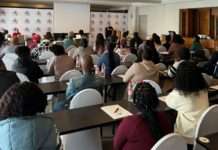The increasing illicit trade in alcohol represents a serious threat to the South African economy due to the loss of taxation, including VAT and excise, as well as jobs contributed by legal alcohol producers and merchants to the fiscus.
South Africa can ill afford this. In his striking 2020 Medium-Term Budget Policy Statement, Minister Tito Mboweni warned that the economy is projected to contract by almost 8% per cent this year, with the outlook for economic growth in 2021 more uncertain. The government desperately needs more tax revenue to support service delivery. Our country needs to find a way to promote growth in existing and new industries and boost job creation.
In 2019, the alcohol sector accounted for 3.4% (R173 billion) of South Africa’s nominal GDP. The government is estimated to lose around R6.4 billion per year due to illegal alcohol trading.
“A 2017 study conducted by Euromonitor confirms that roughly 15% of market share is accounted for by illicit trade or organised crime. That’s a significant portion of market share in the hands of syndicates who have only been further entrenched by the COVID19 lockdown period,” says Kurt Moore, Chief Executive of the South African Liquor Brand Owners’ Association (SALBA). Moore says the problem is widespread and all stakeholders including the police, alcohol manufacturers, retailers, and consumers must work together to combat it.
AN URGENT NEED FOR CHANGE
Entry points
Moore says the industry has identified five ways in which illegal alcohol is infiltrating the market:
- Border smuggling – alcohol imports are smuggled through the border, allowing the goods through without the payment of any border taxes. Moore says this problem is particularly common at the harbours as points of entry.
- Round tripping and diversion – duty-free product meant for export sold in the local market. This illegally obtained alcohol is then sold at prices lower than market value.
- Counterfeit products – this is a relatively small occurrence compared to the first two entry points outlined above. In this case, criminals attempt to produce a cheaper knock-off of popular alcohol brands.
- Hijackings – This means of unlawfully obtaining product while in transit has increased substantially during the COVID19 pandemic.
- Armed robberies of liquor stores and manufacturers –these incidences have also increased, with about 400 robberies reported during the lockdown.
Inadequate prosecutions for offenders, porous borders and corruption are just some of the problems that led to illicit alcohol flooding the market and continue to agitate the situation.
How to spot illicit alcohol
From retailers to the consumer on the street, it can be easy to identify fake or illegal alcohol if you know what to look for:
- Place – only buy alcohol from a reputable store or manufacturer.
- Price – illegal alcohol is often sold at below market prices. These prices are low for one of two reasons; either the alcohol was smuggled into the country illegally without paying taxes, or it has been stolen through a criminal act like a hijacking. Prices can be up to 50% cheaper.
- Packaging –Look carefully at the label for duller and less accurate paint work. Bottle tops are often made of inferior material and tend to bend or crumple on opening. Be wary of loose bottle tops and broken seals as this indicates a product that has been tampered with or is an inferior product. Also look out for products marked for export as these are not meant to be sold on the local market.
- Product – Examine the bottle. Look out for fake versions that sport misspelt names of popular brands as well as products which display alcohol content not compliant with the 43% ABV content prescribed for certain spirits, by the Liquor Products Act 60 of 1989.
What South Africans can do
Clamping down on the opportunities for illicit trade is the joint responsibility of alcohol producers, retailers, hotels, government, law enforcement and the consumer. Organised crime targets every level within the value chain. If the demand is reduced through effective governance and responsible consumerism, the impact can be dramatically reduced, and job losses can be avoided.
“We are committed to ensuring the responsible trading of liquor. We appeal to all our stakeholders and consumers to help us stamp out the scourge of illicit trade. The billions in tax revenue lost to illicit trade belongs to all South Africans and should be used to accelerate service delivery” Moore concludes.
SALBA, working with BASA (Beer Association of South Africa) and Vinpro, has set up a toll-free hotline – 0800 014 856 – which you can call to report any suspected illegal alcohol trading. The hotline is administered by the Consumer Goods Council of South Africa and law enforcement will liaise on cases reported via this channel. The alcohol industry will also be working more closely with the government, retailers, the hospitality industry, and other partners to embark on a programme to address this issue.












